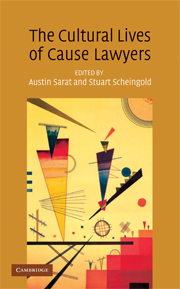Book contents
- Frontmatter
- Contents
- Acknowledgments
- Contributors
- Bringing Cultural Analysis to the Study of Cause Lawyers: An Introduction
- PART I THE CULTURAL WORK OF CAUSE LAWYERS
- PART II THE CULTURAL CONSTRUCTION OF LAWYERS AND THEIR CAUSES
- PART III THE CULTURAL RECEPTION OF LAWYERS AND THEIR CAUSES
- 11 Cause Lawyering “English Style”: Reading Rumpole of the Bailey
- 12 Now You See It, Now You Don't: Cause Lawyering, Popular Culture, and A Civil Action
- 13 Not What They Expected: Legal Services Lawyers in the Eyes of Legal Services Clients
- Index
11 - Cause Lawyering “English Style”: Reading Rumpole of the Bailey
Published online by Cambridge University Press: 08 January 2010
- Frontmatter
- Contents
- Acknowledgments
- Contributors
- Bringing Cultural Analysis to the Study of Cause Lawyers: An Introduction
- PART I THE CULTURAL WORK OF CAUSE LAWYERS
- PART II THE CULTURAL CONSTRUCTION OF LAWYERS AND THEIR CAUSES
- PART III THE CULTURAL RECEPTION OF LAWYERS AND THEIR CAUSES
- 11 Cause Lawyering “English Style”: Reading Rumpole of the Bailey
- 12 Now You See It, Now You Don't: Cause Lawyering, Popular Culture, and A Civil Action
- 13 Not What They Expected: Legal Services Lawyers in the Eyes of Legal Services Clients
- Index
Summary
Introduction
Rumpole of the Bailey, a character that comes from the pen of English author and barrister Sir John Mortimer QC, is in the first instance a rather unexpected choice of subject for a study of the cultural life of cause lawyering. Rumpole is a barrister who plies his trade in the criminal courts. In his first appearance on TV, in December 1975 in a drama screened as part of the British Broadcasting Corporation's (BBC) prestigious series, Play for Today, Rumpole's redoubtable wife Hilda chastises him by calling him an “Old Bailey hack.” “Old Bailey” describes not only the location of his lawyering, London's central criminal court, but it also has a more withering tone that suggests Rumpole has failed to rise above the lowliest form of practice: criminal trial advocacy. This tone is amplified by the term “hack,” which emphasizes the everyday, the commonplace, and the mundane quality of the criminal work that is his stock in trade. His clients tend to be an assortment of ordinary and everyday underdogs; a black working-class teenager, a child in the care of the State, a hippie, a family of minor misfits, and so on. “Hack” also suggests that he is more a “hired gun” (doing whatever work he can to scratch out a living) than a “moral activist” whose legal practice is politically engaged and dedicated to the service of social justice.
- Type
- Chapter
- Information
- The Cultural Lives of Cause Lawyers , pp. 297 - 330Publisher: Cambridge University PressPrint publication year: 2008



